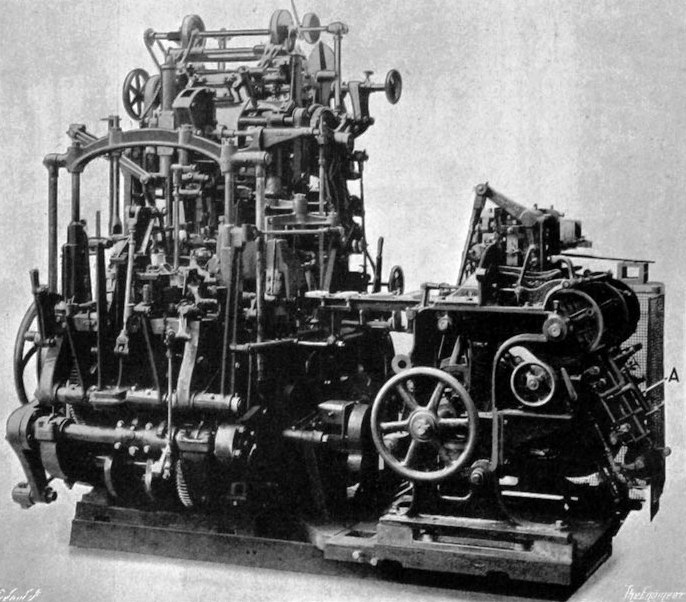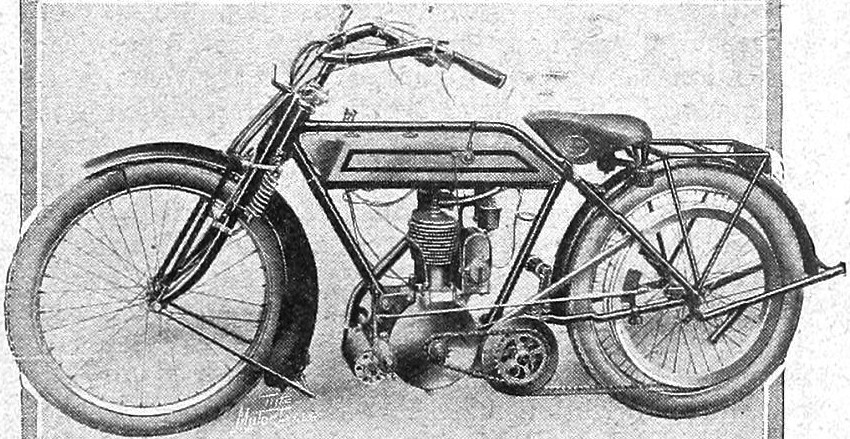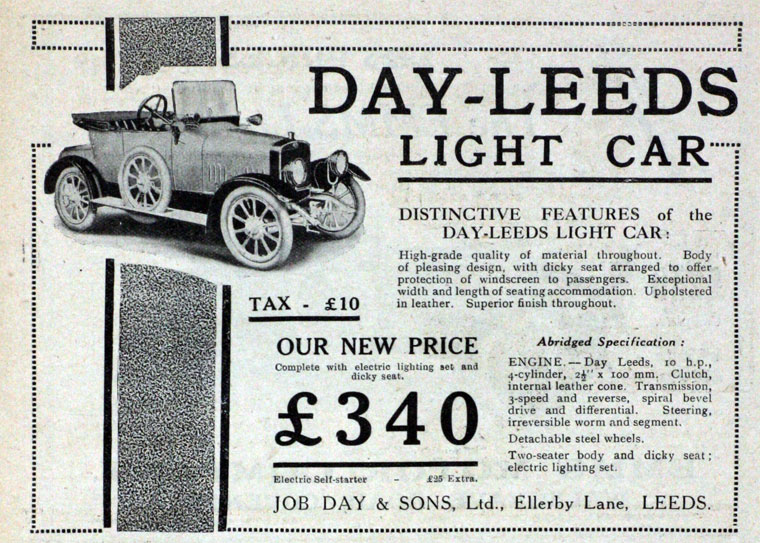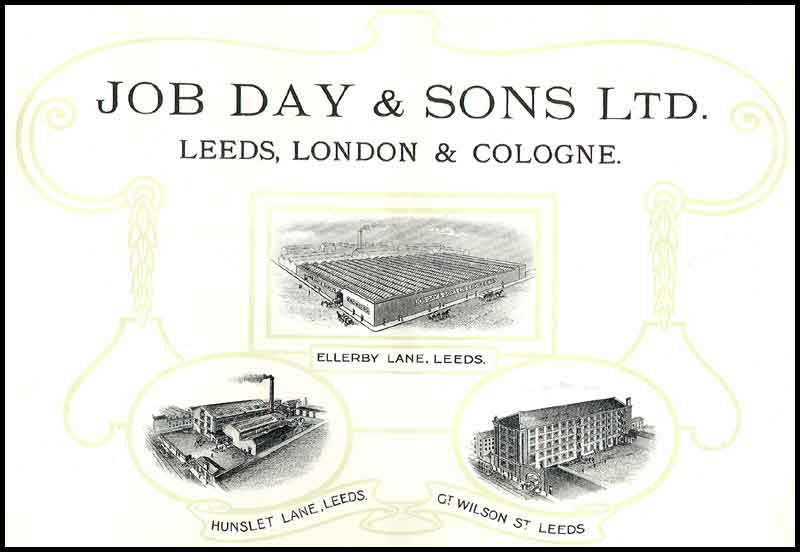
Job Day was born in 1840 at Ulceby a small Lincolnshire village and his father was Thomas Day a farm labourer and his mother was Mary Day.
The family comprised of John and Job Day and in 1861 at the age of 21 Job had a career as a Tea Dealer and was still living in Ulceby. In 1874 there was a patent to Job Day and William Wells Osgoby both of Brigg, Lincolnshire, taken out for the invention of “An improved composition for the removal and prevention of incrustation in steam boilers.”
In 1881 Job Day is seen as a Dry Soap Manufacturer living in Glanford Brigg, Lincolnshire with his wife Betsey Day and their children William, Charles, Adie Alice, Sarah Jane, and Albert. But three years later his dry soap business of Job Day & Sons in Brigg, Lincolnshire was liquidated.
1885 saw Day leaving Lincolnshire and moving to Leeds where he started a new business in Ellerby Lane. This was just east of the River Aire just below Fearn’s Island in an area known as “The Bank” with its streets of back-to-back houses with small companies in industry and manufacturing not now seen in the west.
The Company was to eventually become once again Job Day & Sons. In the 1891 census he is shown living at No.4 Glossop Terrace in the Woodhouse area as an employer in a dry soap manufacturing business and a widower with his five children, William Henry (clerk), Charles Herbert (manager at the dry soap works), Adie Alice, Albert (foreman), and Sarah Jane, the last three were born in Leeds.
In 1901 he is shown as being remarried and living in North Leeds with his wife Ada Ellen Day and still a dry soap manufacturer while at the age of 71 in 1911 he is shown as the maker of patent bag packing machinery and a chemical manufacturer and still living in North Leeds with his wife Ada also 71. Six years later, in 1917, his death was announced at Knaresborough leaving his sons to carry on the business.
In 1901 Jacob Day invented a machine for packing soap; they also made the world’s first bacon slicer, and a motor cycle as well as packaging machinery before becoming Job Day & Sons.
Another intriguing advance was made in the in the area of bag making, packaging and labelling that was patented in 1908 by Job, Charles Herbert, and Albert Day, the machine was described in 1924 as being “apparently complicated” but actually “simple and almost human” in the way it was able to create a finished product in 90 minutes. The success of this machine can be drawn from the knowledge that the firm were able to sell a similar device to Japanese Company in 1966.

The “Eclipse” motorcycle was produced in 1912 and was designed by HA Smith and built by Job Day & Sons and was powered by their own 499cc engine that had overhead inlet valve and a special lubricating system. It had an Edlin frame (motor cycle produced in Birmingham 1911 to 1912), Druid Forks (spring forks for early motor cycles), Bosch magneto, Belt drive, and a half-compression device for starting. Production of this lasted until the First World War.

Ellerby Lane was the main factory but there were two more, one in Great Wilson Street and in 1910 they set up a factory in Hunslet Lane next door to the Elementary School and this seems to have been where the main car production was centred.
In 1912 they made their first car, the start of the “Day-Leeds” a cyclecar powered by a 998cc v-twin engine they had built themselves, the tubular steel chassis had half-elliptic springs all round (main photo, above).
Drive was through a cone clutch, three-speed gearbox with differential and finally a belt or chain drive to each rear wheel. The basic car was an open two-seater and cost £110 or £120 with windscreen, lights, and horn. It was no longer being advertised in 1913 so production may have ceased.
For 1914 a completely new and more conventional light car was shown at the 1913 London Motor Show. It was fitted with an 1130cc engine made by Turner but this was soon replaced by a 1286cc water-cooled side valve engine made by themselves. This engine had been designed by WL Adams of the Laxtonia Engineering Works, Peterborough.
The car had semi-elliptic leaf springs, rear wheel only brakes, with a wheelbase of 7’ 9” and drive was to the rear axle by a cone clutch and a separate three-speed gearbox and torque tube. The First World War stopped all production.
After the war this model was revived and it was fitted with electric lights. The body types were a two-seat open car or a coupe with a body made by Lockwood & Clarkson based at Sheepscar Grove and Sheepscar Street South, Leeds. The price quoted for the UK market in 1919 was £400 for the open two-seater, this seamed to be uncompetitive because by the time all production stopped in 1926 the price had dropped to £225. It is thought that 300 cars were made in the post-war period, some being exported overseas (only two cars are thought to survive, one in England and one in Australia).
In the 1930s there were three production factories in Leeds but in 1935 the Company moved to their new Beeston Royds Works, Leeds, this stood roughly at the Junction 1 (M621) trading estate where B&Q and Iceland now stand. This was where they concentrated on the production of their range of packaging machinery.
In 1960 they were acquired by Rose Brothers Limited of Gainsborough, Lincolnshire; this take over only lasted for twelve month before they too were acquired by the Baker Perkins Group and were considered the most prominent manufacturer in the UK of machines for packaging tea and granulated materials.
With the formation of Rose Forgrove Limited in 1967, Job Day became one of the three divisions of the Company specialising in packaging machines for tea and coffee. All this lasted until 1970 when Leeds City Council purchased their Beeston Royds property for a road improvement scheme, the works were demolished and the business was moved to the Rose Gainsborough works which had been reorganised and expanded in 1970. It was then that the name Job Day & Sons started to disappear and became slowly forgotten.
In 1980 and 1981 Rose Forgrove obtained three large orders for over £15 million from Russia for tea packing machines, LC 150, these were developments of the original Job Day machine, 18 of which had been supplied to Russia by Job Day in 1907.
While you’re here, can we ask a favour?
South Leeds Life is published by a not-for-profit social enterprise. We keep our costs as low as possible but we’ve been hit by increases in the print costs for our monthly newspaper which have doubled in the last two years.
Could you help support local community news by making a one off donation, or even better taking out a supporters subscription?
Donate here, or sign up for a subscription at bit.ly/SLLsubscribe




